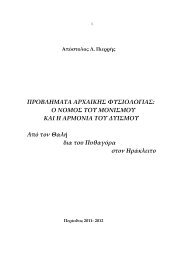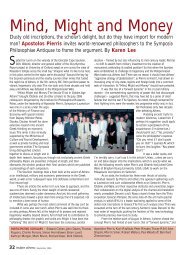chapter 10 the monism of darkness and the dualism of limit and ...
chapter 10 the monism of darkness and the dualism of limit and ...
chapter 10 the monism of darkness and the dualism of limit and ...
You also want an ePaper? Increase the reach of your titles
YUMPU automatically turns print PDFs into web optimized ePapers that Google loves.
MONISM OF DARKNESS - DUALISM OF LIMIT AND INDETERMINACY 61<br />
apple¿ÙÔÚ·˜ apple¿ÓÙˆÓ ÁÂÁÔÓ¤Ó·È appleÚÒÙÔ˘˜Ø ÙcÓ ÌbÓ ÁaÚ °ÉÓ Î·d ÙeÓ<br />
≠HÏÈÔÓ, ÊËÛ›Ó, nÓ Î·d \AapplefiÏψӷ ÙfiÙ ηÏÂÖÓ, ÁÔÓÂÖ˜ ·éÙáÓ âapple›-<br />
ÛÙ·ÓÙÔ Ôî ÙfiÙ ôÓıÚˆappleÔÈ, ÙÔf˜ ‰b âÎ ÙÔ‡ÙˆÓ ÙÚ›ÙÔ˘˜ apple¿ÙÔ-<br />
Ú·˜ (instead <strong>of</strong> ÙÚ›ÙÔ˘˜ apple·Ù¤Ú·˜). Apparently, this is an attempt at an<br />
etymological explanation <strong>of</strong> a word <strong>of</strong> unknown meaning. Third,<br />
counting from <strong>the</strong> Earth <strong>and</strong> <strong>the</strong> Sun (in Sky’s place), are <strong>the</strong> Ocean<br />
<strong>and</strong> Tethys. If <strong>the</strong> Sun be regarded as a Titan, son <strong>of</strong> Earth <strong>and</strong> Sky,<br />
<strong>the</strong>n third in ascending order is Phanes; which is possible by virtue <strong>of</strong><br />
<strong>the</strong> ontological equation <strong>of</strong> Eros <strong>and</strong> Spirits, but unlikely on account<br />
<strong>of</strong> <strong>the</strong> consubstantiation <strong>of</strong> both oceanic <strong>and</strong> aerial confluence that<br />
would ensue, <strong>and</strong> also because <strong>the</strong> copulation <strong>of</strong> Sun <strong>and</strong> Earth is<br />
substituted for <strong>the</strong> marriage <strong>of</strong> Sky <strong>and</strong> Earth as fertile coition.<br />
Philochorus, no doubt, wanted to combine <strong>the</strong> cult <strong>of</strong> Tritopatores<br />
with <strong>the</strong> cult <strong>of</strong> Apollo Patroos (Bekker, Anecdota Graeca p. 291.33;<br />
Sch. in Aristidem p. 14). The explanation <strong>of</strong> <strong>the</strong> name with reference<br />
to ÙÚ›ÙÔ˜ is unsuccessful; cf. Bekker, Anecdota Graeca p. 307.16: ÙÚÈ-<br />
ÙÔapple¿ÙÔÚÂ˜Ø Ôî ÌbÓ ÙÔf˜ appleÚÒÙÔ˘˜ àÚ¯ËÁ¤Ù·˜, Ôî ‰b ÙÚ›ÙÔ˘˜ àapplee ÙÔÜ<br />
apple·ÙÚfi˜, ¬appleÂÚ âÛÙd appleÚÔapple¿appleappleÔ˘˜. However, this interpretation seems<br />
to have been adopted by Aristotle: Pollux Onomasticon III, 17: ï ‰b<br />
apple¿appleappleÔ˘ j Ù‹ı˘ apple·ÙcÚ appleÚfiapple·appleappleÔ˜, ó˜ \IÛÔÎÚ¿ÙË˜Ø Ù¿¯· ‰’ iÓ<br />
ÙÔÜÙÔÓ ÙÚÈÙÔapple¿ÙÔÚ· \AÚÈÛÙÔÙ¤Ï˘ ηÏÔÖ (cf. Rose, Aristoteles<br />
Pseudepigraphus Fr 369 = Aristotelis Fragmenta 415). For <strong>the</strong><br />
etymology <strong>of</strong> Tritopatores cf. TÚÈÙÔÁ¤ÓÂÈ· (cf. Kretschmer, Glotta X,<br />
1920, p. 38sqq. <strong>and</strong> XII, 1923, p. 214. For an overview v. O. Gruppe,<br />
Griechische Mythologie und Religiongeschichte vol. II p. 1143 n. 1.<br />
Hesychius’ gloss (s.v. ÙÚÈÙÒØ ÙÚfiÌÔ˜, Êfi‚Ô˜) is ra<strong>the</strong>r promising (cf.<br />
s.v. TÚÈÙÔÁ¤ÓÂÈ·Ø ì Ùe ÙÚÂÖÓ âÁÁÂÓáÛ· ÙÔÖ˜ âÓ·ÓÙ›ÔȘ <strong>and</strong> s.v. ÙÚÈÙÔ-<br />
ÎÔ‡ÚËØ Fw apple¿ÓÙ· Û˘ÓÂÙ¤ÏÂÛÙ·È Ùa Âå˜ ÙÔf˜ Á¿ÌÔ˘˜Ø ÙÈÓb˜ ‰b ÁÓËÛ›·<br />
apple·Úı¤ÓÔ˜). If <strong>the</strong> root ÙÚÈÙÒ means terror, Tritopatores will <strong>the</strong>n be<br />
<strong>the</strong> terrible Fa<strong>the</strong>rs (first ancestors), Tritogeneia <strong>the</strong> terrible daughter<br />
<strong>and</strong> Tritokoure <strong>the</strong> terrible maiden.<br />
6. In Phoenicia, Judaea <strong>and</strong> Canaan we find a dualistic cosmogony<br />
in which <strong>the</strong> active principle <strong>of</strong> mobility is expressed by <strong>the</strong> Air <strong>and</strong><br />
<strong>the</strong> Breath <strong>of</strong> Air, whereas <strong>the</strong> Abyss <strong>of</strong> Waters signifies <strong>the</strong> receptive<br />
<strong>and</strong> form-acquiring principle <strong>of</strong> Passivity. In a monistic version <strong>the</strong><br />
idea <strong>of</strong> a creative Air-related spiritual first principle takes roots in<br />
Greece <strong>and</strong> develops with <strong>the</strong> philosophy <strong>of</strong> Air as it is articulated by










